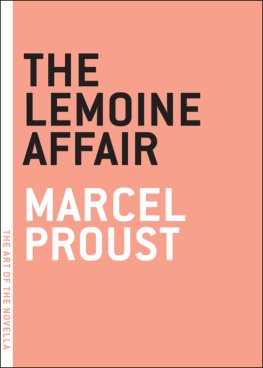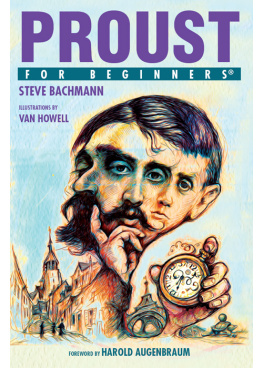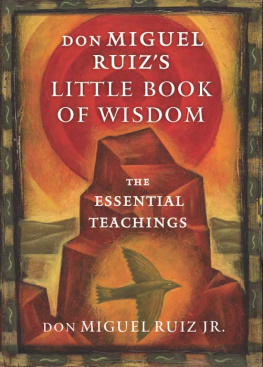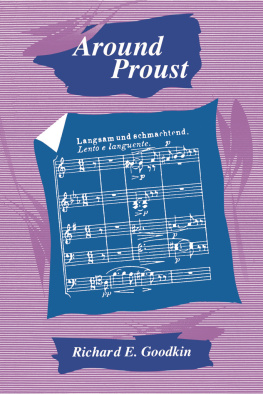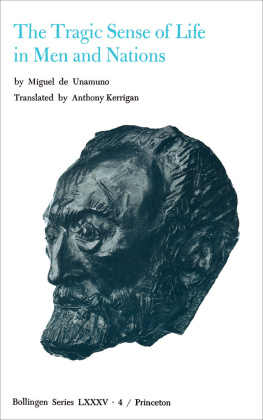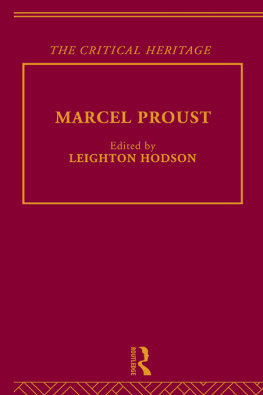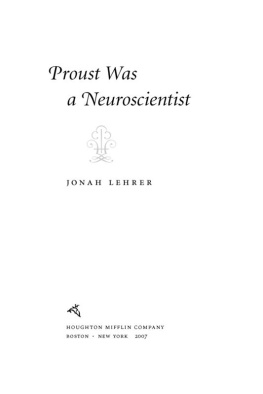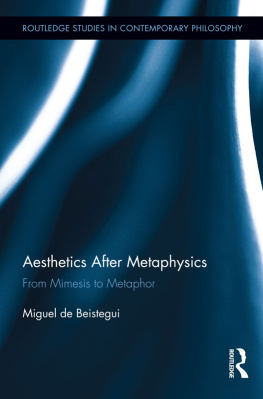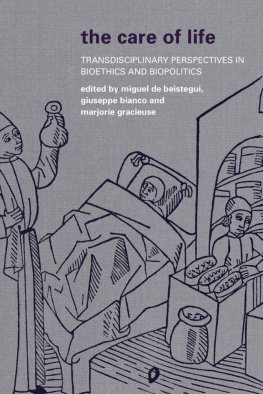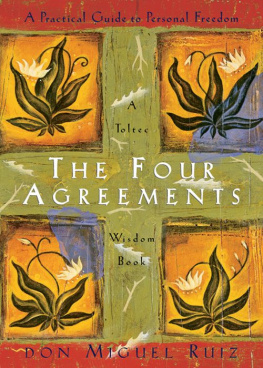Beistegui Miguel de - Proust as philosopher: the art of metaphor
Here you can read online Beistegui Miguel de - Proust as philosopher: the art of metaphor full text of the book (entire story) in english for free. Download pdf and epub, get meaning, cover and reviews about this ebook. City: London;New York, year: 2013, publisher: Taylor & Francis (CAM);Routledge, genre: Religion. Description of the work, (preface) as well as reviews are available. Best literature library LitArk.com created for fans of good reading and offers a wide selection of genres:
Romance novel
Science fiction
Adventure
Detective
Science
History
Home and family
Prose
Art
Politics
Computer
Non-fiction
Religion
Business
Children
Humor
Choose a favorite category and find really read worthwhile books. Enjoy immersion in the world of imagination, feel the emotions of the characters or learn something new for yourself, make an fascinating discovery.
- Book:Proust as philosopher: the art of metaphor
- Author:
- Publisher:Taylor & Francis (CAM);Routledge
- Genre:
- Year:2013
- City:London;New York
- Rating:4 / 5
- Favourites:Add to favourites
- Your mark:
- 80
- 1
- 2
- 3
- 4
- 5
Proust as philosopher: the art of metaphor: summary, description and annotation
We offer to read an annotation, description, summary or preface (depends on what the author of the book "Proust as philosopher: the art of metaphor" wrote himself). If you haven't found the necessary information about the book — write in the comments, we will try to find it.
Proust as philosopher: the art of metaphor — read online for free the complete book (whole text) full work
Below is the text of the book, divided by pages. System saving the place of the last page read, allows you to conveniently read the book "Proust as philosopher: the art of metaphor" online for free, without having to search again every time where you left off. Put a bookmark, and you can go to the page where you finished reading at any time.
Font size:
Interval:
Bookmark:
Proust as Philosopher
Marcel Proust's In Search of Lost Time has long fascinated philosophers for its complex accounts of time, personal identity and narrative, amongst many other themes. Proust as Philosopher: The Art of Metaphor is the first book to try and connect Proust's implicit ontology of experience with the question of style, and of metaphor in particular.
Miguel de Beistegui begins with an observation: throughout In Search of Lost Time, the two main characters seem prone to chronic dissatisfaction in matters of love, friendship and even art. Reality always falls short of expectation. At the same time, the narrator experiences unexpected bouts of intense elation, the cause and meaning of which remain elusive. Beistegui argues we should understand these experiences as acts of artistic creation, and that this is why Proust himself wrote that true life is the life of art.
He goes on to explore the nature of these joyful and pleasurable experiences and the transformation required of art, and particularly literature, if it is to incorporate them. He concludes that Proust revolutionises the idea of metaphor, extending beyond the confines of language to understand the nature of lived, bodily experience.
Miguel de Beistegui is Professor of Philosophy at the University of Warwick, UK. His books include Aesthetics After Metaphysics: From Mimesis to Metaphor (Routledge, 2012), Immanence and Philosophy: Deleuze (2010), Truth and Genesis: Philosophy as Differential Ontology (2005) and Heidegger and the Political (Routledge, 1998). He is editor (with Simon Sparks) of Philosophy and Tragedy (Routledge, 2000).
Proust as Philosopher
The Art of Metaphor
Miguel de Beistegui
Translated by Dorothe Bonnigal Katz, with Simon Sparks and Miguel de Beistegui

LONDON AND NEW YORK
Originally published 2007 as Jouissance de Proust pour une esthtique
de la mtaphore
This translation first published 2013 by Routledge
2 Park Square, Milton Park, Abingdon, Oxon, OX14 4RN
Simultaneously published in the USA and Canada by Routledge
711 Third Ave., New York, NY 10017
Routledge is an imprint of the Taylor & Francis Group, an informa business
Copyright LES BELLES LETTRES collection Encre Marine
Translation Routledge, 2013
All rights reserved. No part of this book may be reprinted or reproduced or utilised in any form or by any electronic, mechanical, or other means, now known or hereafter invented, including photocopying and recording, or in any information storage or retrieval system, without permission in writing from the publishers.
Trademark notice: Product or corporate names may be trademarks or registered trademarks, and are used only for identification and explanation without intent to infringe.
British Library Cataloguing in Publication Data
A catalogue record for this book is available from the British Library
Library of Congress Cataloging in Publication Data
Beistegui, Miguel de, 1966
[Jouissance de Proust. English]
Proust as philosopher : the art of metaphor / by Miguel de Beistegui;
translated by Dorothe Bonnigal Katz, with Simon Sparks and Miguel de
Beistegui.
p. cm.
Includes bibliographical references and index.
1. Proust, Marcel, 18711922Criticism and interpretation. 2. Proust, Marcel,
18711922. la recherche du temps perdu. 3. Metaphor in literature. I. Title.
PQ2631.R63Z525713 2012
843.912-dc23
2012007041
ISBN: 978-0-415-58431-9 (hbk)
ISBN: 978-0-415-58432-6 (pbk)
Typeset in Sabon
by Taylor & Francis Books
Contents
Chapter 1
Looking for joy
What sort of existence would raise our hopes and awaken our desires simply in order to dash them? What sort of world would clip imagination's wings? Answer: this one.
Whenever we think we're sowing the seeds of happiness, life's busy planting those of disillusionment. Whenever we think we're working carefully towards contentment we are, in fact, hurtling towards our doom. A single life can hold more disillusion and disappointment than we can imagine: every second of happiness will eventually fade, every fleeting joy will quickly be replaced by ever increasing sorrow; every desire fulfilled will end up either boring us or making us insatiable, in thrall to the ever more urgent exercise of the will.
And? Is this the lesson of Proust's vast novel? Is this really what In Search of Lost Time establishes as a universal law, setting itself up in the process as the novel of suffering and melancholia? Having such absurdly high expectations from art and from life in general is only ever going to open us up to the threat of disappointment. The book's moral, itself a disappointment how could it be anything else? would be that, by expecting less from life, by settling for a little bit less, we might avoid being disappointed; by letting go of our desires and breaking free of our will, we might be spared innumerable sufferings.
Nothing, though, could be further from the truth, nothing more at odds with the spirit of Proust than this sort of pseudo-Stoic or -Schopenhauerian lesson. Why? Because it's precisely this sort of suffering that hones our senses and sharpens our intelligence. Life itself sets us off on a quest for what such suffering hides, making that same discomfort instrumental in discovering its buried truths. And this is why it doesn't make much sense to say that, through the narrator, the novel simply presents us with a type, one psychological profile among many; instead, it tries to unveil a truth that lies dormant within the type in question. Ultimately, Proust's point is to show that the dissatisfaction whether in the form of suffering or in the form of boredom that defines our relation to the world actually stems from an even deeper lack, one inscribed at the heart of reality itself. Which means what, exactly? That reality itself and alone is responsible for our misfortune? That the conditions of our disappointment are structural and not circumstantial, that they are inherent to our relation to the world rather than to any given character trait? Well, yes, providing that we're clear on what reality means, and its meaning is, as I'll try to show, a paradoxical one. Implicitly universal and unshakeable, it leads directly to a feeling of separation and alienation, of an irreversible lack. Overcoming this feeling will involve seeing reality differently and, in truth, creating it.
My point of departure, then, consists in identifying an ontological deficiency, a deficiency with respect to being, which I'd define in the following way: at the heart of our relation to the world there's a lack. This lack isn't nothing, however, but is, rather, a lack or want of being, a lack or want that functions as the sign of a truth that lies beyond or, more accurately, at the heart of present reality. This lack is original and structural and so isn't something that could be remedied by a strategy of compensation, by recapturing or reproducing the thing that's lacking. Rather, it's the figure of the real in its self-transposition or transfiguration. Metaphor believes in transubstantiation, in the conversion of matter into spirit, which it carries out, but only as an implicit dimension of matter itself, inscribed within it from the start.
***
None of which, of course, necessarily prevents reality from being a source of disappointment. And, were it not for one or two clues and for the way in which these clues come together in the final revelation of a very different state of affairs, it would be easy to see in Proust's work a true abhorrence of time, a true source of bitterness and resentment. His world would be one teetering on the verge of nihilism. Isn't Swann's whole life just like his study of Vermeer that remains constantly imminent, constantly postponed undermined by a point lessness that nothing's going to be able to refute? Doesn't Jean Santeuil fail to find any pleasure in writing down the memory of his walks at Beg-Meil?
Font size:
Interval:
Bookmark:
Similar books «Proust as philosopher: the art of metaphor»
Look at similar books to Proust as philosopher: the art of metaphor. We have selected literature similar in name and meaning in the hope of providing readers with more options to find new, interesting, not yet read works.
Discussion, reviews of the book Proust as philosopher: the art of metaphor and just readers' own opinions. Leave your comments, write what you think about the work, its meaning or the main characters. Specify what exactly you liked and what you didn't like, and why you think so.

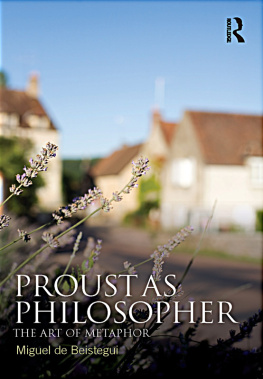
![Beistegui Miguel de - Heidegger [and] the political: Dystopias](/uploads/posts/book/181018/thumbs/beistegui-miguel-de-heidegger-and-the.jpg)
